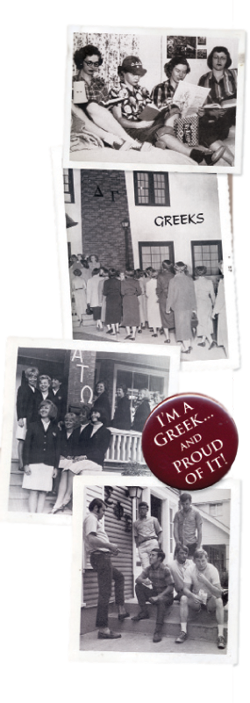Artifacts
Greek fraternities and sororities, like those who have belonged to them, have changed with the style and times of the past century.

Top to bottom: Sisters in Delta Delta Delta, known as the Tri Delts, spending a quiet night in the house in 1951. Hopeful pledges enter the Delta Gamma house during Rush Week in 1952; The Little Sisters of the Maltese Cross stand in front of the Alpha Tau Omega fraternity in 1965. The brothers of Sigma Phi Epsilon spend time outside of the house in 1968.
In January 1904, fraternity Eta Phi Mu took in four initiates in a rented house on South Sixth Street. The fraternity then petitioned to become the Beta Delta Chapter of Sigma Chi Fraternity in 1906.
In the meantime, Missoulian John M. Evans petitioned UM to form a chapter of Sigma Nu Fraternity that would become UM’s first national fraternity. A local sorority, Delta Sigma, formed its own chapter in 1905. Many Delta Sigmas became members of Kappa Kappa Gamma when that sorority received its UM charter in 1909—the same year Kappa Alpha Theta received its charter. Other Greek houses that received charters at UM around that time included Delta Gamma in 1911, and Alpha Phi and Sigma Phi Epsilon in 1918.
Greek life provided an immediate community for its members. Strong study habits were encouraged. Philanthropic projects bespoke the inherent promises of helping others in Greek life.
And the social life was nonstop. House duties, pledge duties, and study tables were balanced out by songfests, hayrides, intramural sports, the annual Greek Olympics, Derby Days, the Violet Ball, and countless functions and firesides.
The Greeks hold a quieter presence on campus today with nine Greek houses at the University and a total membership of 310, including fall 2008 pledges. Active houses include fraternities Kappa Sigma, Sigma Alpha Epsilon, Sigma Chi, Sigma Nu, and Sigma Phi Epsilon and sororities Alpha Phi, Delta Gamma, Kappa Alpha Theta, and Kappa Kappa Gamma.
Dedicated alumni continue to raise funds, recruit new members, help with house maintenance, and look for ways to keep the Greek system alive. The Greek Task Force, an organization of UM Greek alumni, holds regular meetings and conference calls, manages a scholarship fund, and maintains a regular newsletter.
Greek Life Adviser Tyson McLean oversees Interfraternity Council and Panhellenic activities from his office in the University Center. McLean foresees a Greek presence on campus for many years to come. The system still delivers the deep bonds many students seek when they come to college, he says. And a Greek connection still provides one of the strongest ties to UM an alum can have. He admits, though, that many students don’t have the extra time it takes to participate in a sorority or fraternity. Many students work up to forty hours a week, as well as attend classes. Student loan debts and cheaper off-campus housing also can trump the choice to go Greek.
But ask a Greek alum returning to campus for a football game, Homecoming, or a reunion, and most wouldn’t trade their years as a house member for anything. Something happened to them then. Something they still carry with them. Something they treasure.
Kappa Alpha Theta and Kappa Kappa Gamma alumnae will hold centennial celebrations for their chapters’ chartering at Homecoming 2009, October 9-10. Kappa Alpha Theta alumnae can email alphanu100th@gmail.com for more information; Kappa Kappa Gamma alumnae may e-mail Marlys Nelson Barrett at mbarrett@nwi.net.
Take a video tour of UM’s Greek houses by clicking on http://umgreeks.blogspot.com.